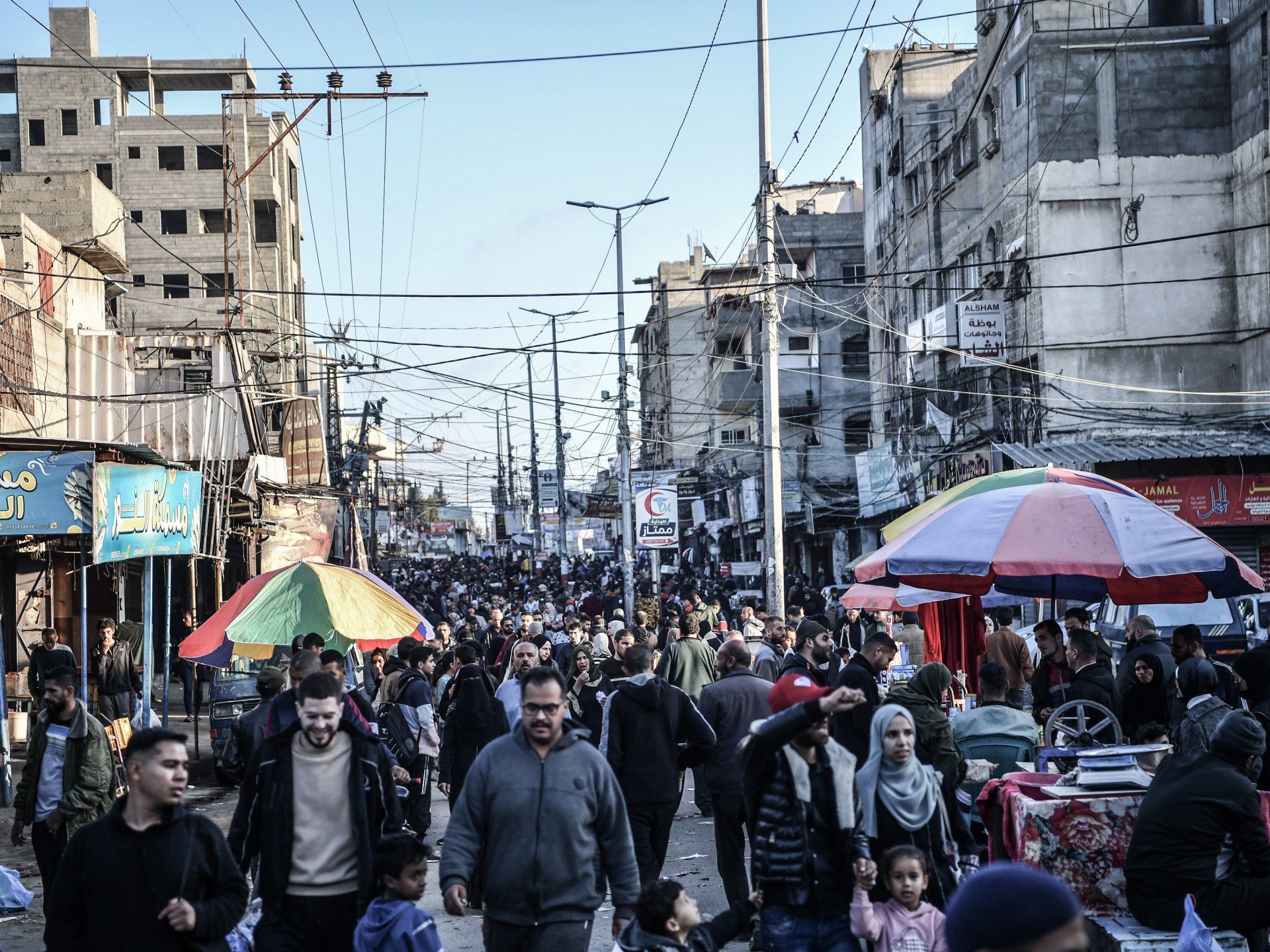Estimates indicate that Rafah currently houses 1.4 million displaced residents of the Gaza Strip (Anatolia)
Israeli Prime Minister Benjamin Netanyahu said that he issued instructions to the Israeli army to plan to evacuate hundreds of thousands of Rafah residents before the expected ground invasion of the city, which has become the last refuge for hundreds of thousands of displaced Palestinians who were displaced by the occupation from many areas in the Gaza Strip.
In an interview conducted with ABC News broadcast today, Sunday, and excerpts of which were published yesterday evening, Saturday, Netanyahu indicated that the occupation army would guarantee a “safe passage” for civilians before the expected attack, and said that there are areas in northern Rafah that “have been cleared and can be used.” As safe areas for civilians,” he said.
The Israeli Prime Minister vowed to control Rafah, which he described as "the last stronghold of the Hamas Brigades," in reference to the Izz al-Din al-Qassam Brigades, the military arm of the Islamic Resistance Movement (Hamas).
Netanyahu responded to the criticism and concerned warnings about the fate of hundreds of displaced civilians if the occupation launched a ground attack on Rafah, saying, “Those who say that we should never enter Rafah are actually telling us that we should lose the war and leave Hamas there.”
Hamas warns
These statements come at a time when warnings are mounting of the serious humanitarian repercussions of any attack on Rafah, which is crowded with hundreds of thousands of displaced people who have taken refuge there from northern and southern Gaza due to the ongoing bombing and Israeli evacuation orders.
Yesterday, Saturday, the Hamas movement warned of a "massacre" in Rafah, which is home to more than a million displaced Palestinians in the southern Gaza Strip, and said in a statement, "We warn of a global catastrophe and massacre that could leave tens of thousands martyred and wounded if Rafah Governorate is invaded."
Hamas said that it holds the US administration, the international community, and the Israeli occupation fully responsible for the safety of the city’s residents.
For his part, European Union foreign policy chief Josep Borrell warned yesterday, Saturday, of the upcoming Israeli attack on Rafah, saying that it would result in an "unspeakable humanitarian catastrophe."
International and regional warnings
The Sultanate of Oman warned on Sunday of the dangerous repercussions of the occupation’s continued aggression against the Gaza Strip and its move to storm Rafah. The Omani Foreign Ministry said in a statement, “We appeal to the international community to take concrete measures to push Israel to cease fire and open the crossings in the Gaza Strip.”
The Saudi Foreign Ministry also warned in a statement yesterday, Saturday, "of the extremely dangerous repercussions of storming and targeting the city of Rafah." She considered that "this continued violation of international law and international humanitarian law confirms the necessity of convening the UN Security Council urgently to prevent Israel from causing an imminent humanitarian catastrophe for which everyone who supports the aggression bears responsibility."
For its part, the US State Department warned this week that “carrying out a similar operation now (in Rafah), without planning and with little thought, in an area inhabited by a million people would be a disaster.” In a rare implicit criticism of Israel, US President Joe Biden said this week that “the response in Gaza is excessive,” stressing that he had made efforts since the start of the war to alleviate its impact on civilians.
In turn, French Foreign Minister Stephane Ségornet stressed that “even though the Israelis’ shock was real” after last October 7, “the situation in Gaza is unjustified.”
As for British Foreign Secretary David Cameron, he said on the X platform, “We are deeply concerned about the possibility of launching a military attack on Rafah.”
The Dutch Foreign Minister also said, "The situation in the Rafah area is very worrying, and we do not see any result of the operations there without a greater humanitarian catastrophe."
Egyptian threat
In the same context, Egyptian Foreign Minister Sameh Shoukry said that increasing the scope of the Israeli military operation would have dire consequences, warning against any additional escalation. He added, in a joint press conference with his Bulgarian counterpart, Maria Gabriel, in the Egyptian capital, that the humanitarian situation in Gaza cannot tolerate more destruction and casualties.
In the same regard, the official Israeli Broadcasting Corporation said that Egypt threatened Israel with suspending the implementation of the peace treaty between the two sides, if its army moved by ground in Rafah.
On March 26, 1979, Egypt and Israel signed a peace treaty in Washington, following the Camp David Accords between the two sides in 1978.
The most prominent provisions of the treaty include stopping the state of war, normalizing relations, Israel’s complete withdrawal of its armed forces and civilians from the Sinai Peninsula, and keeping the zone demilitarized.
The Israeli authority quoted the American newspaper "The Wall Street Journal" as saying that Cairo also issued a warning to the Islamic Resistance Movement (Hamas), stating that it must reach a prisoner exchange deal within two weeks, otherwise Israel will continue its ground operation in the Gaza Strip.
She noted that Egypt has intensified its defense system on the border with fences, cameras, surveillance towers, and sensors.
Since the seventh of last October, the occupation army has been waging a devastating war on Gaza that has so far led to the fall of more than 28,000 martyrs, most of whom are women and children, and about 70,000 wounded, in addition to the destruction of the cities of the Strip and the displacement and starvation of its residents.
Source: Al Jazeera + agencies

